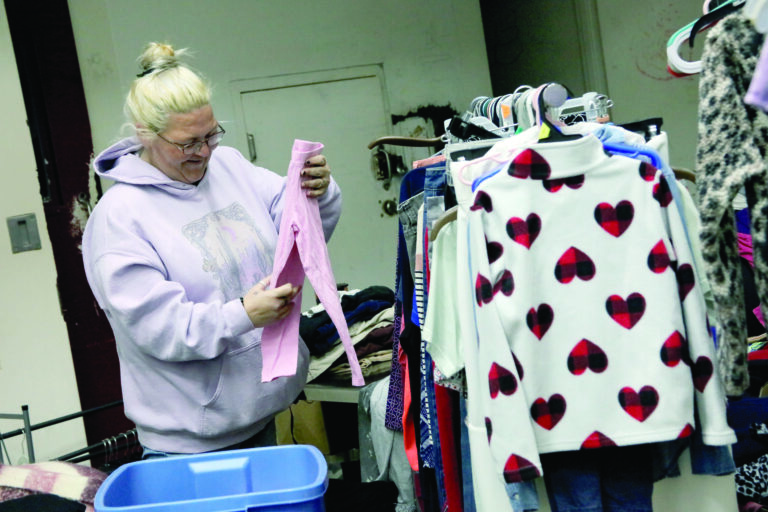State Board of Education visits Cassville
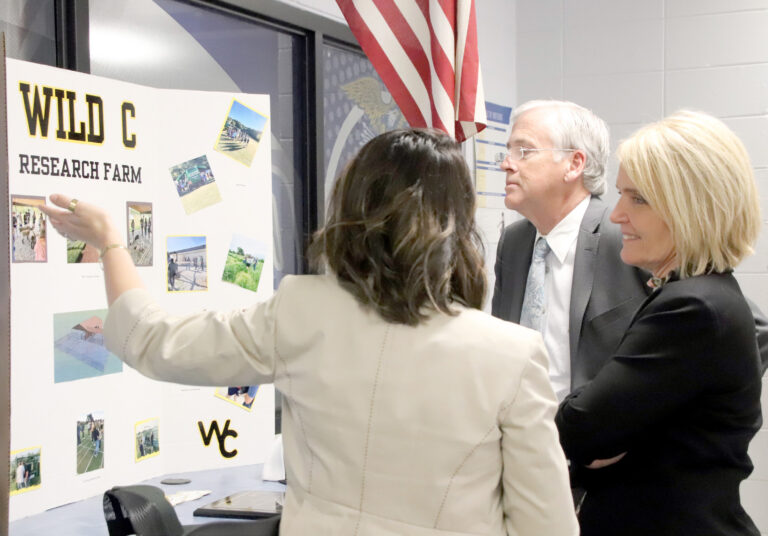
Board President: ‘Cassville has a board of community leaders that are engaged’
By Kyle Troutman [email protected]
Twenty-one state education officials visited the Cassville school district for about an hour on Thursday, hearing about the district’s challenges and successes and discussing how they could help.
The Missouri State School Board and Department of Elementary and Secondary Education (DESE) staff, led by Board President Charlie Shields and DESE Commissioner Margie Vandeven, were en route to a board meeting at Roaring River State Park.
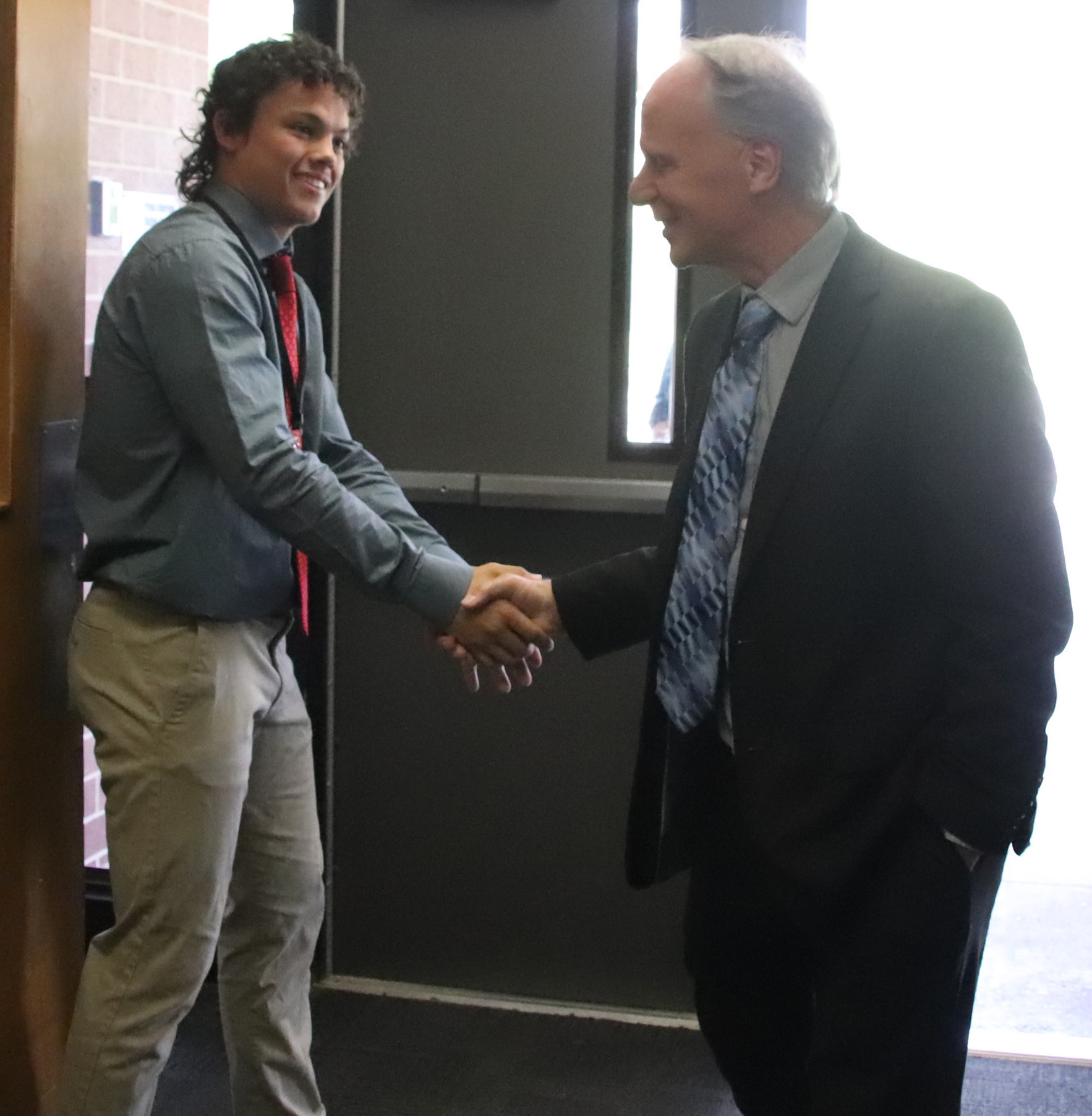

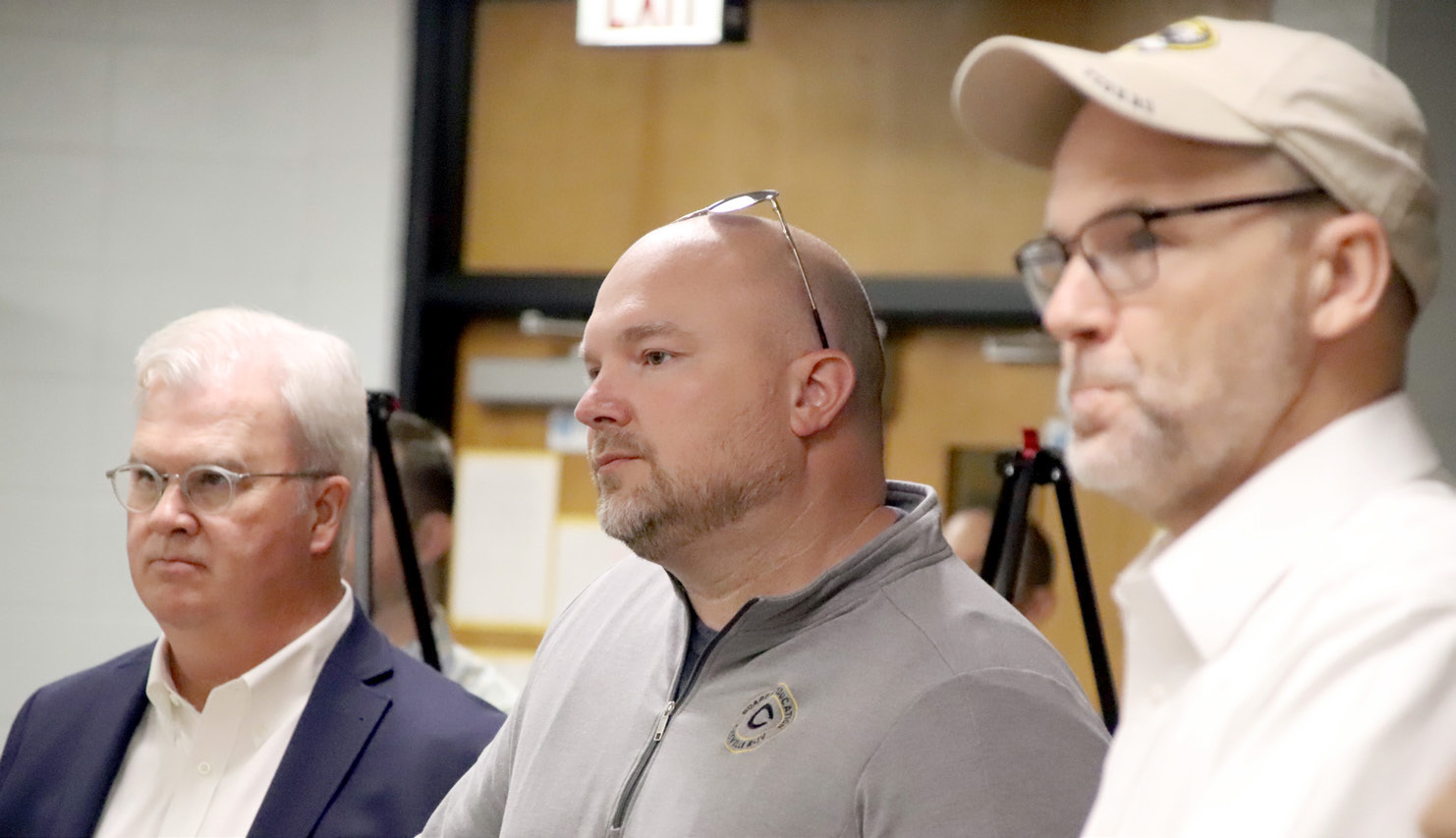
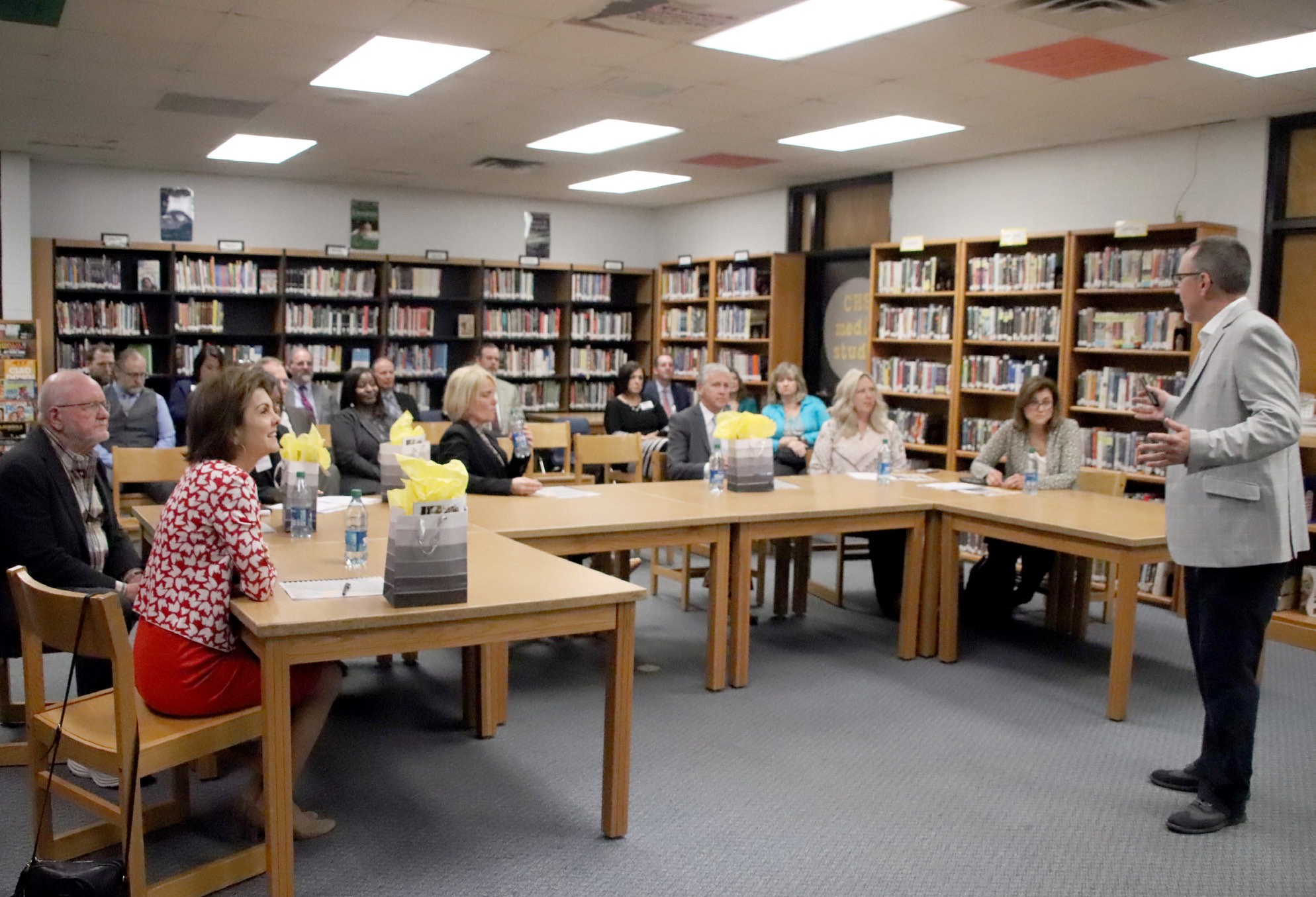

Cassville High School students met the group, which moved to the library for a presentation on Cassville’s work on the Missouri School Improvement Program (MSIP6), Annual Performance Report (APR) and Comprehensive School Improvement Plan (CSIP).
The MSIP6 houses the state’s standards for reviewing and accrediting schools, the APR is a review of the district based on meeting MSIP6 standards, and the CSIP is the district’s plan to meet these standards.
Implemented in 2022, the MSIP6 has more rigorous standards that have led to a general drop in APR scores statewide. Merlyn Johnson, Cassville superintendent, told visiting officials Cassville was used to being an upper 80th or 90th percentile district, but this year, Cassville is at 76.9 percent.
However, Johnson highlighted the district’s CSIP plan as actively targeting the areas that need attention, and the district celebrates where it is already finding success.
One area Cassville scored lower than desired was in attendance, a challenge district leaders say is greater than before the COVID-19 pandemic. Traci Mitchell, Cassville assistant superintendent, said COVID left an effect of parents being overly cautious when sending possibly sick children.
Still, other students or parents believe they do not need to always attend in person because of virtual learning opportunities.
“It’s almost like we are having to re-train parents and re-train kids,” she said.
Furthermore, Mitchell and Cassville High School Principal Tyler Willis said mental health issues have increased.
Near the end of the presentation, Kent Medlin, DESE area supervisor of instruction, lauded Cassville’s CSIP plan as one of the best in southwest Missouri.
“Cassville has bought into this, and it’s not easy,” he said. “They are taking ownership of their score and ownership of making it better, working the process to do it right. [Cassville is one of the] shining stars in southwest Missouri. Its CSIP is dynamic and accountable, and it will pay off because it is intentional — that combination leads to success.”
Johnson pointed out earlier during his presentation the Cassville School Board agenda is tied directly to the CSIP, with the corresponding CSIP section listed with each agenda item.
Following Medlin’s remarks, Shields credited Cassville for taking the right steps and celebrating its success, then asked what the board could do for Cassville.
“I feel like you have a direct line to the legislators,” Johnson said. “We have some concerns, but the majority of our issues surround school reform. Failing schools are more in the urban areas, and we need major reform, but we’ve got more great things happening than bad here, and we don’t want to be continually bombarded with things that do not pertain to Cassville.
“We are not planning on going to four days per week like many rural schools are, but we sit back and ask, how far will this go?”
Wade Hermansen, Cassville School Board member, added the board would like to see more consistent support that would give districts confidence to take on large projects.
“It’s hard to make a decision like putting P.A.W.S. on the ballot because we don’t feel like we have a solid base and are supported by the state,” he said.
Shields said his answer would be as Missouri-School-Board-Association as it could sound, but the state board needs to reinforce stability and positive strides in education.
“When there’s all this discussion about how horrible public education is, we need to ask the legislators who exactly they are talking about,” he said. “When we redid the APR, they said the lower scores proved schools were all failing, but when all the schools were in the 90th percentile, they said public education was failing then, too. So, we are trying to find a roadmap.”
Shields and Mitchell then both spoke up for teachers and retention, another area that has suffered in post-COVID years. Mitchell said she does all she can to get student teachers.
“With Crowder and Missouri State here, we try to get as many student teachers as we can, but it’s tough to get students to commit to teaching,” she said. “We have our Student Body President Jacob Martinez, who plans to go into education, and we are schmoozing him already.”
Mitchell said at a recent college-sponsored teacher hiring event for education graduates, employers outnumbered potential employees.
“There were 43 graduates, and 48 schools there to recruit them,” she said.
State Board of Education Member Peter Herschend asked Johnson what the No. 1 challenge is for incoming teachers.
“Pay,” Johnson said. “And, Cassville is one of the larger school districts in the area, so it’s not hitting us as hard as the smaller schools near us.”
Understanding that challenge, Herschend asked what the No. 2 deterrent is for possible incoming educators. Johnson said student behavior has been a factor for many.
“We have a new generation of parents, and that is showing,” Johnson said. “We will continue to make improvements based on our CSIP and understanding every child is different.”
After the presentation and subsequent discussion, state officials split between going to an FFA room for a presentation by Cassville students on the Wild C Research Farm, or going back to the building’s entrance to hear about incoming security upgrades funded by the bond issue passed on April 4.
Shields stayed in the library to field questions from the Cassville Democrat.
He said the board takes one meeting each year and makes a trip out of it, typically cycling between the St. Louis, Kansas City, and rural areas.
“The idea is to meet with board members and schools to allow them to ask us questions,” he said. “We have 518 districts, and they vary tremendously, so we try to expose the Board and DESE staff to different schools.”
Shields said from the exchange with Cassville officials, the issue of teacher recruitment and retention stuck out in his mind.
“That’s why we established the Blue Ribbon Commission,” he said. “We’ve had a tremendous loss of teachers in their first five years, and in any other industry, that would be considered a crisis. Compensation is on the issues, and what we call culture and environment in the classroom is also a challenge.”
The Blue Ribbon Commission is a teacher recruitment and retention commission charged with delivering a report to the board, which provided a summary of the Commission’s work, along with action steps, suggested legislative policy changes and any other strategies recommended to address challenges.
Shields, a former school board member at Mid-Buchanan school district, added local school boards realize education is a 12-year process for each student, and there should be more stability at the state level so districts can plan.
“One of the things we hear is this mantra that public education is failing, but when we travel to schools and are around students, listening to the things they are doing and their aspirations, it’s pretty hard to argue it’s failing. That does not mean there are not challenges, but there is clearly a positive impact made in public schools. We have to figure out those challenges and celebrate the successes.
“[When I was at Mid-Buchanan, we didn’t CSIP discussions, so the fact Cassville has a board of community leaders that are engaged in making the school better is amazing.”
The 21 state officials’ meeting was in between a similar visit to the Monett school district and the public April State Board of Education Meeting held Thursday and Friday at the Emory Melton Inn and Conference Center.
State officials in attendance included: Board of Education members Shields, Herschend, Carol Hallquist, Peter Herschend, Kim Bailey, Kerry Casey and Pamela Westbrooks-Hodge; and Department of Elementary and Secondary Education Commissioner Vandeven, Medlin, Chief Communications Officer Mallory McGowin, Kari Monsees, Tracy Hinds, Sarah Madden, Mike Harris, Lisa Sireno, Paul Katnik, Chris Neale, Shelley Woods, Bart Washer, Mark Wheatley,

